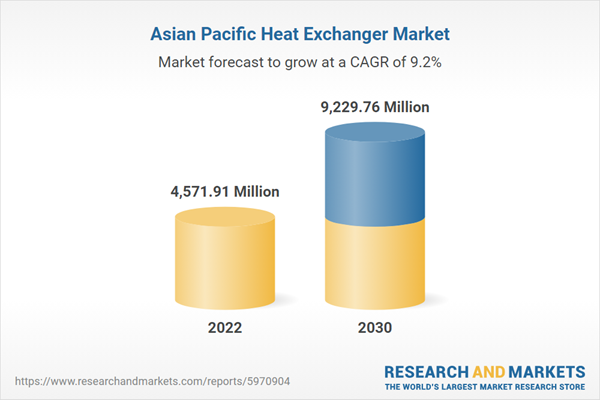Integration of 3D Printing Technology with Heat Exchangers Fuel the Asia Pacific Heat Exchanger Market
3D printing or additive manufacturing is the development of a three-dimensional object from a digital file. The demand for 3D printing solutions is rising owing to advantages such as flexible design, rapid prototyping, print of demand, lightweight and robust parts, faster design and customized production, minimum waste, cost-effectiveness, and environment friendly. In addition, the rising awareness worldwide to use environment-friendly solutions and associated GHG emissions are encouraging heat exchanger providers to use this advancing technology to produce new products to meet the demand from various end user applications. The growing need for efficient heat exchangers in crucial applications such as power generation systems, consumer electronics, and food and beverage manufacturing facilities contribute to the adoption of 3D printing technology. Thus, the integration of 3D printing technology with heat exchangers is likely to create opportunities for market players to meet the growing demand from various end user applications during the forecast period.Asia Pacific Heat Exchanger Market Overview
The Asia Pacific heat exchanger market is categorized into Australia, China, Japan, India, South Korea, Malaysia, Taiwan, and the Rest of Asia Pacific. The growing market is prominently attributed to the expansion of LNG imports led by China and India. Furthermore, the rising investment in the oil & gas industry will propel oil and gas production. As per the Shell LNG Outlook 2021, the LNG demand across the globe is expected to reach 700 million tons by 2040, and the natural gas demand is expected to grow strongly in Asia Pacific countries, generating the demand for gas production. With the rise in population and industrial growth, Asia Pacific witnessed increased energy demand. For instance, according to IEA, Southeast Asia's energy demand grew by an average of 3% every year from 2000 to 2020. It is further expected to grow by an average of 5% every year till 2030. Such a rise in demand in the region made the government expand its oil production units by introducing new refineries and expanding the production capacity of the existing oil refineries. As per the Energy Information Administration (EIA), at least nine refineries projects are expected to be completed by the end of 2030 in Asia and the Middle East. The rise in oil production generates the need for heat exchangers in the plants and refineries, which further fuels its market growth in the region.Asia Pacific Heat Exchanger Market Segmentation
The Asia Pacific heat exchanger market is segmented based on type, material, application, and country. Based on type, the Asia Pacific heat exchanger market is segmented into shell and tube, plate and frame, air cooled, and others. The shell and tube segment held the largest market share in 2022.Based on material, the Asia Pacific heat exchanger market is segmented into steel, copper, and others. The steel segment held the largest market share in 2022.
Based on application, the Asia Pacific heat exchanger market is segmented into energy, chemical, food and beverages, HVACR, pulp and paper, and others. The energy segment held the largest market share in 2022.
Based on country, the Asia Pacific heat exchanger market is segmented into China, Japan, South Korea, India, Australia, Taiwan, Malaysia, and the Rest of Asia Pacific. China dominated the Asia Pacific heat exchanger market share in 2022.
Alfa Laval AB, API Heat Transfer Inc, Chart Industries Inc, Danfoss AS, Guntner GmbH & Co KG, Johnson Controls International Plc, Hisaka Works Ltd, Kelvion Holding GmbH, Larsen & Toubro Ltd, and Xylem Inc are some of the leading companies operating in the Asia Pacific heat exchanger market.
Table of Contents
Companies Mentioned
- Alfa Laval AB
- API Heat Transfer Inc
- Chart Industries Inc
- Danfoss AS
- Guntner GmbH & Co KG
- Hisaka Works Ltd
- Johnson Controls International Plc
- Kelvion Holding GmbH
- Larsen & Toubro Ltd
- Xylem Inc
Table Information
| Report Attribute | Details |
|---|---|
| No. of Pages | 109 |
| Published | March 2024 |
| Forecast Period | 2022 - 2030 |
| Estimated Market Value in 2022 | 4571.91 Million |
| Forecasted Market Value by 2030 | 9229.76 Million |
| Compound Annual Growth Rate | 9.2% |
| Regions Covered | Asia Pacific |
| No. of Companies Mentioned | 10 |









